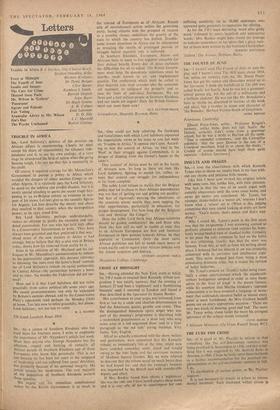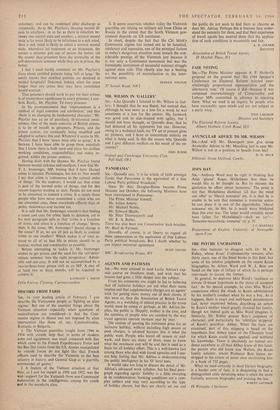SIR,—It is good of Mr. Playfair to inform us that
something like the self-determinate sentence was being practised in Amsterdam in 1596, and that some- thing like it was suggested by Mr. Sanford Bates in America in 1960. I hope he looks upon these incidents as a further recommendation for the practical im- plementation of. the self-determinate sentence in full. 'I do, To clarification of various points, as Mr. Playfair requests: It is not necessary to remain in prison to receive mental treatment. Such treatment within prison is voluntary, and can be continued after discharge as voluntarily. As to Mr Playfair's likening mental ill- ness to smallpox: in so far as there is infection be- tween one mental state and another, a normal mental state is far more likely to be infectious to a sick mind, than a sick mind is likely to infect a normal mental state; wherefore (a) treatment or no treatment, the sooner a prisoner gets out of prison the better; (b) the sooner that prisoners have the normality of the self-determinate sentence while they are in prison, the better.
1 feel I need hardly comment on Mr. Playfair's fears about certified patients being 'left at large.' He surely knows that certified patients are detained in mental hospitals? Detained, indeed, often for years longer than any crime they may have committed would warrant.
That prisoners should work to pay for their crimes is of tremendous significance to every prisoner, I con- firm. Really, Mr. Playfair. To every prisoner.
In his pronouncement that 'imprisonment is a method of legal coercion and retribution,' and that 'there is no changing its fundamental character,' Mr. Playfair has an air of peculiarly ill-informed omni- science. One of the main concerns of British prisons is to be of benefit to prisoners. Prisons, and the prison system, are constantly being modified and adapted to achieve this end. Whatever it seems to Mr. Playfair that I have 'never been able to grasp,' it is because I have been able to grasp these essentials that I know there is both need and place for civilian working conditions, responsibilities and status re- gained, within the prison sentence.
Having dealt with the likeness Mr. Playfair found between mental sickness and smallpox. I now find Mr. T. L. Iremonger, MP, hinting that I have likened crime to measles. Picturesque, but not so. Nor would I say that crime is 'extraneous to the normal order of things.' On the contrary, I would say that crime is part of the normal order of things, and for this reason requires treating as such. People do not need to be abnormal to commit a crime, It is surely those people who have never committed a crime who are the abnormal ones, these everybody-affluent days of perks, motorways and income tax.
It is odd that Mr. Iremonger considers that finding a cause and cure for crime leads to delusion, yet in his next paragraph tells us that 'crime is a function of stress, and stress is a function of change.' Stress, then, is the cause, Mr. Iremonger? Social change is the cause? If so, we are all just as likely to commit crime as one another? Which makes it of vital in- terest to all of us that life in prison should be as human, normal and constructive as possible.
Before attempting to tackle it, Mr. Iremonger wishes to get prison and the need for the self-deter- minate sentence 'into the right perspective.' Admir- able and not easy. It will not be accomplished by a two-to-three-hour prison visit as an MP. A stay of at least two to three months will be required to achieve it.
K ATHLEEN J. SMITH



































 Previous page
Previous page